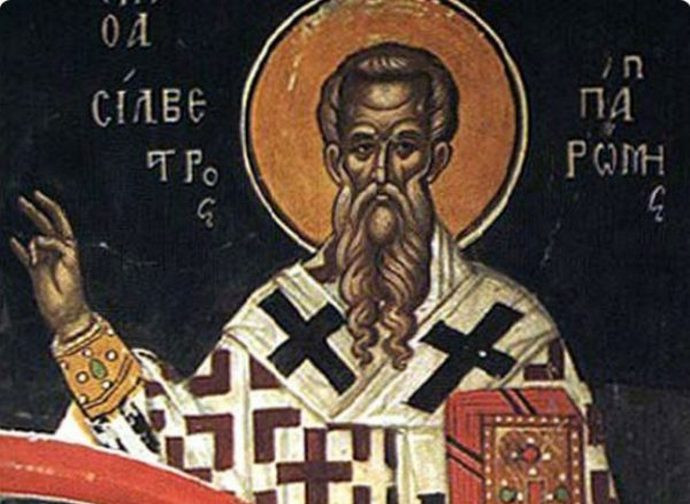Saint Sylvester I
Saint Sylvester I († 31 December 335) saw the transition from the persecutions of Christians to the establishment of freedom of worship in the Roman Empire. His 21-year pontificate coincided with the extraordinary period of consolidation of Christianity

Saint Sylvester I († 31 December 335) saw the transition from the persecutions of Christians to the establishment of freedom of worship in the Roman Empire. His 21-year pontificate, in fact, coincided with the extraordinary period of consolidation of Christianity under Constantine (274-337) and the progressive decline of paganism. Sylvester was elected Pope in 314, a year after the Edict of Milan had confirmed the 311 Edict of Serdica, by allowing Christians to freely profess their faith.
From the very beginning of his pontificate, Sylvester was able to observe Constantine's religious activism, dictated by the understanding that unity among Christians would favour the stability of the empire. He also noted the Emperor's personal approach to Catholicism in public actions and private correspondence alike. Thus, to put an end to the riots caused in Africa by the schismatic Donatus and his followers, Constantine convened the Council of Arles in 314, which ended with the condemnation of Donatism, a heresy (nevertheless destined to survive for some time) that linked the validity of the sacraments to the worthiness of their ministers. The bishops present at the Council wrote a deferent letter to Sylvester communicating the decisions taken, together with the desire that he, whose authority was paramount, would make them known to the whole Christendom.
But the most important event under his pontificate was undoubtedly the first ecumenical council in history, held, again, by Constantine (with the pope sending his representatives) in Nicaea in 325. Its purpose was to arrive at a unitary dogmatic response on some doctrinal controversies, first of all the Arian heresy, which denied the divinity of Christ. The Council Fathers, who included the bishops and future saints Hosius of Corduba and Alexander of Alexandria, condemned Arianism and wrote the Nicene Symbol, that is, the first formulation of the Creed, later modified by the Council of Constantinople. This statement of faith defined the consubstantiality between the Father and the Son, who is "true God from true God, begotten, not created, of the same substance as the Father".
Arius and Eusebius of Nicomedia, the main representatives of the best-known Christological heresy, however, did not abandon their errors. In the next few years, they persuaded Constantine to accept Arianism. In 335, in fact, the emperor convened the Council of Tyre, where the Arians were in the majority, and condemned Saint Athanasius, a staunch defender of orthodoxy. He was later exiled by the emperor, amid protests from the pope, who died at the end of the same year.
Prior to these events, which coincided with the definitive move of Constantine to the East (where he founded Constantinople, the New Rome), Sylvester had the great merit of promoting the construction of the ancient Christian basilicas to the emperor, who then extended the initiative to the new capital of the empire, as well as Jerusalem. If the foundation of the Lateran Basilica is to be ascribed to his predecessor, Saint Miltiades, it was Sylvester who dedicated it to the Most Holy Savior, and it is most likely that the works were completed under his own pontificate, during which Saint Peter's Basilica and that of Saint Paul Outside the Walls were also built – on the respective sepulchres of the two holy apostles and martyrs. On the tombs of several other martyrs Sylvester founded cemetery churches, one of which was erected by the Catacombs of Priscilla, where he was then buried. To Sylvester we also owe the foundation of the first schola cantorum, and it is also possible that the first Roman martyrology was written during his pontificate.
Patron of: bricklayers, stonecutters
